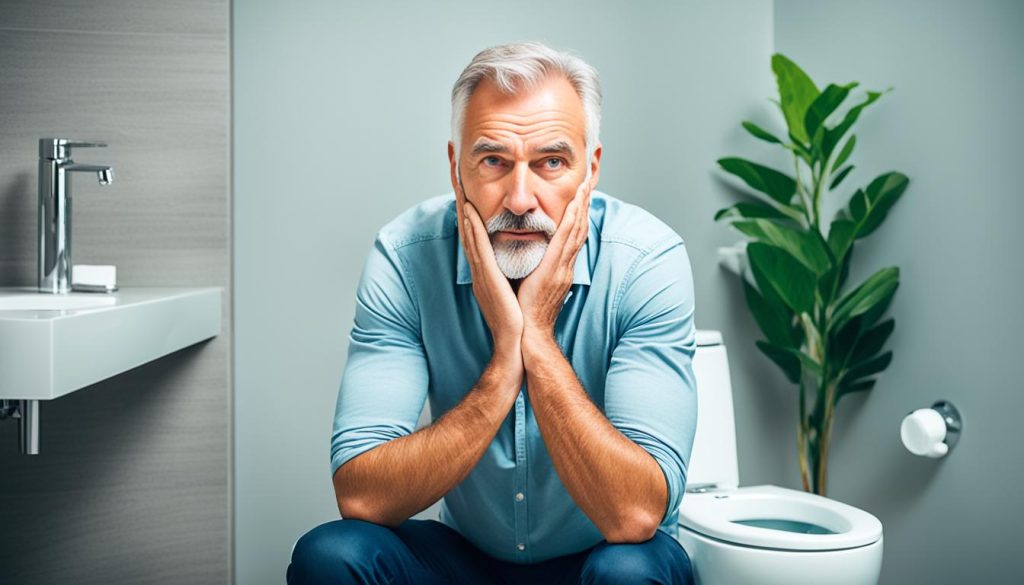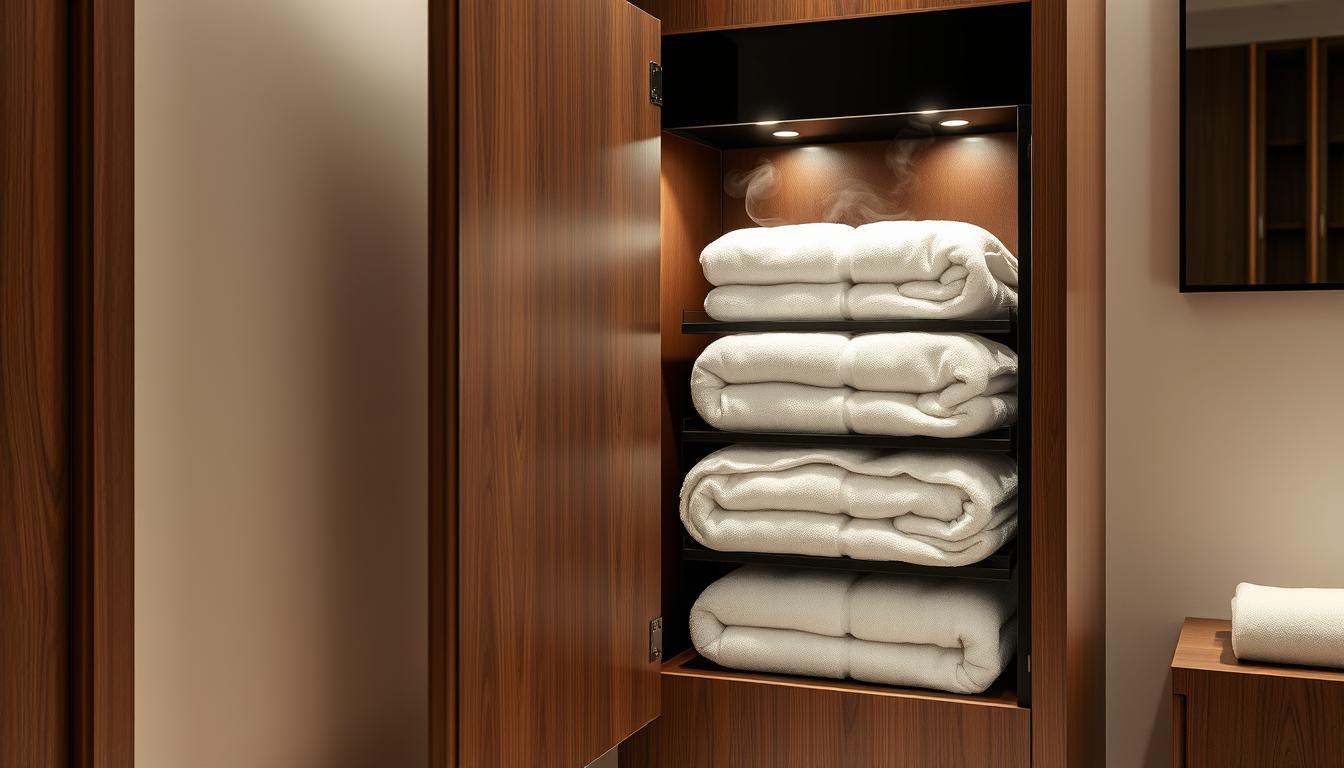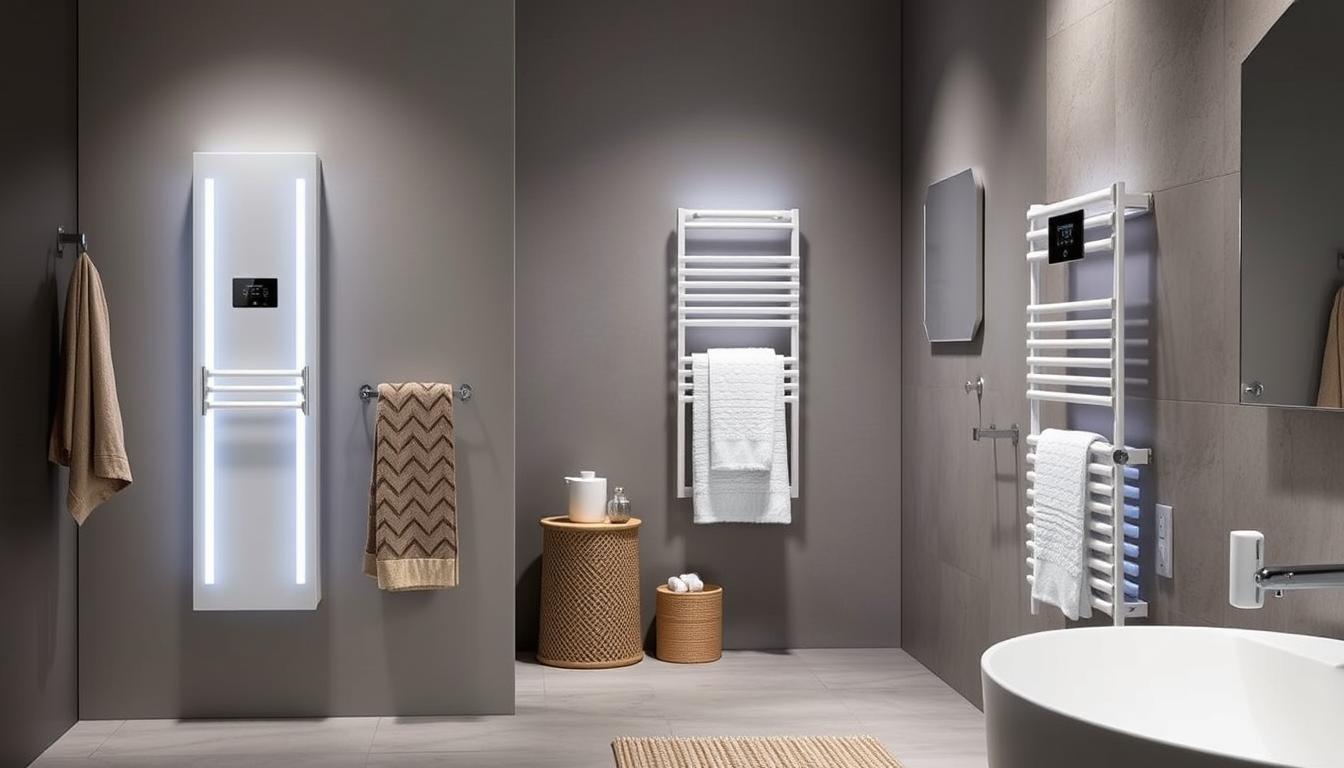Constipation is a common problem, affecting up to 38% of pregnant women. If you’re experiencing constipation, you’re not alone. Factors like reduced gastrointestinal motility and increased water absorption in the colon contribute to this discomfort. But here’s some good news: bidets can provide relief and improve your digestive health.
Bidets have long been used in Turkish society, primarily for hygiene purposes. However, recent research has shown that bidets can also alleviate constipation symptoms. By cleansing the anal region with water, bidets can stimulate the rectum, promote bowel movement, and provide relief without the need for medication.
In this article, we’ll explore the benefits and effectiveness of bidets for constipation relief. We’ll delve into the science behind bidet usage and its impact on constipation severity. So, if you’re looking for a natural solution for constipation, keep reading to discover how bidets can make a difference.
Key Takeaways:
- Bidets can alleviate constipation symptoms by stimulating the rectum and promoting bowel movement.
- Traditional bidet usage in Turkish society has long been associated with constipation relief.
- A study focusing on pregnant women demonstrated a significant reduction in constipation severity with bidet usage.
- Bidets offer a non-pharmacological option for constipation relief without the risk of side effects.
- In addition to using a bidet, maintaining a high-fiber diet, drinking plenty of water, and exercising regularly can also help alleviate constipation.
Understanding Constipation and its Impact
Constipation is a common digestive issue that can cause discomfort and disrupt daily life. It is characterized by infrequent bowel movements, hard stools, and a feeling of incomplete evacuation. Understanding the causes and impact of constipation is crucial in finding effective solutions to manage and alleviate the symptoms.
There are several factors that contribute to constipation. One common cause is a low-fiber diet, which lacks the necessary roughage to promote regular bowel movements. Insufficient water intake can also contribute to constipation, as hydration is essential for maintaining proper digestive function. Additionally, a lack of exercise can slow down the digestive process, leading to constipation.
Constipation is prevalent in various demographics, including women, children, and the elderly. It is estimated that 33 out of every 100 adults over the age of 60 suffer from constipation symptoms. Recognizing the prevalence of constipation and its impact on different groups is important for providing targeted support and treatments.
Common Symptoms of Constipation
- Infrequent bowel movements
- Difficulty or strain during bowel movements
- Passing hard stools
- A feeling of incomplete evacuation
- Bloating and abdominal discomfort
It is crucial to take constipation symptoms seriously and seek appropriate measures to address the issue. Ignoring or neglecting constipation can lead to complications such as hemorrhoids, anal fissures, and fecal impaction.
To combat constipation, it is recommended to incorporate lifestyle changes such as following a high-fiber diet, increasing water intake, and engaging in regular physical activity. These simple adjustments can have a significant positive impact on bowel movements and overall digestive health.
Constipation is a common digestive problem that can affect people of all ages. By understanding the causes and symptoms, we can take proactive steps to alleviate constipation and improve our well-being. Remember to maintain a healthy diet, drink plenty of water, and stay active to promote regular bowel movements.
| Constipation Causes | Symptoms of Constipation | Constipation Prevalence |
|---|---|---|
| Low-fiber diet | Infrequent bowel movements | 33 out of 100 adults over the age of 60 |
| Insufficient water intake | Difficulty or strain during bowel movements | |
| Lack of exercise | Passing hard stools |
Understanding the causes and impact of constipation empowers individuals to make informed choices for their digestive health. By adopting a holistic approach and incorporating healthy habits into our daily routines, we can effectively manage constipation and experience improved overall well-being.
Bidets: A Natural Solution for Constipation Relief
Bidets have gained recognition for their ability to provide relief and prevention for constipation symptoms. Unlike traditional toilet paper usage, bidets offer a hygienic alternative that can contribute to improved digestive health. Through the gentle stimulation of water, bidets facilitate easier defecation and offer a range of benefits for constipation relief.
When using a bidet, small amounts of water are introduced into the anus, stimulating the rectum and encouraging bowel movement. This gentle water stimulation can activate the nerves responsible for movement in the rectum, promoting natural bowel function. Additionally, the water stream from the bidet provides a soothing and rejuvenating rectal massage, further contributing to improved bowel movement.
“Bidet usage offers a natural and hygienic solution for constipation relief. The water stimulation and rectal massage provided by bidets can assist in alleviating constipation symptoms and promoting regular bowel movements.”
-Dr. Emma Johnson, Gastroenterologist
Another notable advantage of bidet usage is the avoidance of toilet paper. Toilet paper can be abrasive and irritate the anal area, especially in the case of constipation-related anal fissures. By using a bidet, you can maintain proper hygiene without the potential discomfort caused by toilet paper.
Furthermore, bidets offer a sustainable solution that reduces the consumption of toilet paper, helping reduce your ecological footprint. This environmentally friendly aspect adds to the appeal of bidet usage.
Benefits of Bidets for Constipation Relief
| Benefit | Description |
|---|---|
| Bidet Water Stimulation | The introduction of water stimulates the rectum and encourages bowel movement. |
| Bidet Nerve Stimulation | The water stream from the bidet activates nerves responsible for movement in the rectum. |
| Bidet Rectal Massage | The water provides a gentle massage to the anal area, promoting bowel movement. |
| Bidet Hygiene | Using a bidet eliminates the need for potentially abrasive toilet paper, improving anal hygiene. |
| Bidet Avoidance of Toilet Paper | Bidet usage reduces the consumption of toilet paper, offering a sustainable solution. |
By incorporating bidets into your daily routine, you can experience the natural benefits they provide for constipation relief. The water stimulation and gentle rectal massage offered by bidets promote easier bowel movements, contributing to improved digestive health. Additionally, bidets offer a hygienic alternative to traditional toilet paper usage, reducing the risk of irritation and discomfort.

The Effectiveness of Bidets for Constipation Relief
A study focused on pregnant women revealed the efficacy of bidets for constipation relief. The study included an experimental group and a control group, with a total of 60 pregnant women. The experimental group received training on constipation management and used bidets before defecation, while the control group did not.
“The use of bidets before defecation significantly reduced constipation severity and improved overall quality of life for pregnant women.”
The results showed that the intervention group experienced a significant reduction in constipation severity and reported improvements in quality of life, except for satisfaction. This study highlights the effectiveness of bidet usage for pregnant women in alleviating constipation symptoms and improving overall well-being.
Bidet Study Results:
| Group | Bidet Usage | Constipation Severity Reduction | Quality of Life Improvement |
|---|---|---|---|
| Experimental | Used bidets before defecation | Significant reduction | Improved (except satisfaction) |
| Control | Did not use bidets | No change | No change |
These findings demonstrate the potential of bidets as an effective and non-pharmacological solution for constipation relief, specifically for pregnant women. The water stimulation provided by bidets before defecation can significantly reduce constipation severity and improve the overall quality of life. Bidets offer a hygienic and natural approach to alleviate constipation symptoms and promote better digestive health.

Bidet: A Non-Pharmacological Option for Constipation Relief
Bidets offer a safe and effective alternative for constipation relief, without the need for medications. Unlike over-the-counter stool softeners or laxatives, bidets provide immediate relief without the risk of side effects.
Using a bidet involves the use of a strong water stream that loosens hardened stool and stimulates complete bowel movements. This non-pharmacological solution can be particularly beneficial for individuals who prefer natural remedies or have concerns about medication side effects.
Research has shown that bidets offer a hygienic and effective method for alleviating constipation symptoms. The use of bidets mimics the effects of an enema by promoting easier defecation and facilitating bowel movement.
Bidets provide a safe and gentle way to relieve constipation quickly. They are suitable for people of all ages, including pregnant women and individuals with sensitive skin. Using a bidet eliminates the need for excessive wiping, reducing the risk of irritation and discomfort associated with constipation-related anal fissures.
Take advantage of the immediate relief and non-pharmacological benefits that bidets offer for constipation. Incorporating a bidet into your daily routine can provide safe and effective relief from constipation symptoms, promoting better digestive health.

Additional Tips for Relieving Constipation
When it comes to finding relief from constipation, incorporating additional techniques alongside the use of a bidet can be beneficial. One important aspect is maintaining a high-fiber diet. Foods rich in fiber, such as whole grains, legumes, fruits, and vegetables, help add bulk to the stool and promote regular bowel movements.
In addition, adequate water intake plays a crucial role in preventing and alleviating constipation. Make sure to drink plenty of water throughout the day to stay hydrated and keep the digestive system functioning optimally. Hydration helps soften the stool, making it easier to pass.
Regular exercise is another effective way to combat constipation. Physical activity stimulates the muscles in the intestines, promoting bowel movement. Engage in activities like walking, jogging, or yoga to keep your digestive system active and help prevent constipation.
Finally, it’s important to be mindful of the foods to avoid when constipated. Processed and low-fiber foods can worsen constipation symptoms, so it’s best to minimize or eliminate them from your diet. Instead, focus on consuming fiber-rich foods and incorporating healthy dietary habits to support constipation relief and improve your overall digestive health.
FAQ
Can a bidet help with constipation relief?
Yes, bidets have been found to provide relief and prevention for constipation symptoms. They stimulate the rectum and encourage bowel movement by introducing water into the anus. The water stream also provides a gentle massage to the anal area, promoting bowel movement.
How does a bidet alleviate constipation?
Bidets work by loosening hardened stool and stimulating complete bowel movements through a strong water stream. The water activates nerves responsible for movement in the rectum and provides relief without the need for medication.
Are bidets effective for pregnant women with constipation?
Yes, studies have shown that bidets are effective for pregnant women in alleviating constipation symptoms. Research has demonstrated a significant reduction in constipation severity and improvements in quality of life for pregnant women who used bidets.
Are bidets a natural and hygienic solution for constipation relief?
Yes, bidets offer a natural and hygienic way to alleviate constipation symptoms. They eliminate the need for toilet paper, which can irritate constipation-related anal fissures, and provide a gentle and effective cleansing solution.
Are bidets safe to use for constipation relief?
Yes, bidets are a safe non-pharmacological option for constipation relief. Unlike over-the-counter stool softeners and laxatives, bidets provide immediate relief without the risk of side effects. They offer a natural and hygienic solution for promoting bowel movements.
What are some additional tips for relieving constipation?
In addition to using a bidet, maintaining a high-fiber diet, drinking plenty of water, and engaging in regular exercise are important for preventing and alleviating constipation. Avoiding processed and low-fiber foods and incorporating whole grains, legumes, fruits, and vegetables into your diet can also help soften stool and reduce discomfort.


